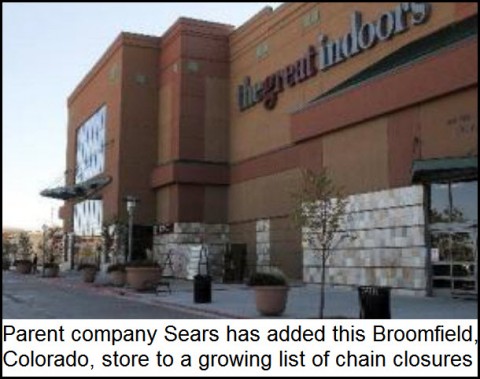The retail blight that has laid waste to malls and shopping plazas across America has claimed yet another high-value victim near our Colorado neighborhood: The Great Indoors, a remodeling and redecorating megastore in Broomfield’s Flatiron Marketplace. When the Sears-owned emporium goes darks in mid-December, it will leave 58 people jobless and a 155,000-square-foot building empty. It could also sink the entire Flatiron Marketplace, since the closure will more than double the facility’s vacancy rate to 67%. That number had hovered near 30% for the last couple of years after Office Depot, Linens N Things and Nordstrom Rack departed in quick succession, leaving the shopping center’s manager with the daunting task of finding new tenants even as retail vacancies continue to soar locally and nationally.
The huge new hole in the retail landscape comes at a bad time for nearby Flatiron Crossing Mall, a 1.5 million-square-foot, $220 million shopping center that itself is reeling from the recent closures of Borders Books and Ultimate Electronics. Other stores that have closed there in recent years include Abercrombie & Fitch, which mistakenly thought its snob-appeal pricing would survive the Great Recession; Fossil, McDonald’s, Godiva Chocolates, Sharper Image and numerous smaller retailers. The exodus actually began about eight years ago when one of Flatiron Crossing’s anchor tenants, Lord & Taylor, became a casualty of a 32-store closing by the parent company. The two-story building that had housed Lord & Taylor, an upscale department store, sat empty for six years, a gangrenous appendage of a mall that has been in survival mode ever since.
Will City Survive Loss?
An even bigger casualty of these closings could be Broomfield, which depends heavily on sales taxes to fill its coffers. Years ago, the City of Broomfield split off from Boulder County and re-incorporated as a county in order to pursue commercial growth aggressively. Regardless of whether this strategy backfires on them, sending Broomfield into bankruptcy, the grim retail picture is certain to necessitate severe budget cutbacks. Towns have gone bankrupt before, and if it were to happen to Broomfield, it wouldn’t be the first time that a an overly ambitious municipal growth scheme put taxpayers on the hook for more than they’d bargained for.
We can’t speak for other regions of the country that may be experiencing similarly hard times on the retail front. In fact, our observations have downplayed the extent of the local problem, which has seriously affected or shuttered several malls in the area. We can’t imagine who will eventually fill the huge spaces being left by The Great Indoors, Borders, CompUSA and too many others. Even more worrisome is the possibility that the few big-box store chains that remain will go out of business, creating more vacancies than could be filled, even, in a decade of prosperity. It took much longer than that to bring U.S. consumerism to a full-boil, and even if it should return, the big-box concept may be dead, replaced by online shopping.
***
(If you’d like to have Rick’s Picks commentary delivered free each day to your e-mail box, click here.)


I just returned from a week of leaf peeping in New England. It wasn’t just the fall colors that were eye-opening.
You get a real sense of how far down the arc we’ve regressed when you see the row upon row of once-great factories repurposed for condos–for whom, I don’t know. Entire heavy industries gone, taking thousands of jobs with them. And what do we have in its place?
It seems to me Americans no longer believe we can get rich doing each others’ laundry. With all the environmental regs that have to be met these days, that’s a rather passe business. Now, we seem to believe that what America needs is to fill up every vacant space with nail salons, tee shirt shops and restaurants. I know we’re a well-manicured, casually dressed and overfed population, but my God: how many of these businesses do we need?
It is very sad to hear the stories of the political and industrial leaders who did great things when we were a young and hungry nation. We cannibalize our history, cobble together a recreation of it to sell to the tourists and make sure we have the biggest American flag decal on our bumper that we can find.
It’s amazing that in only 50 years, we have sold just about everything worthwhile to the highest bidder foreign or domestic and are now content to pat ourselves on the back and talk about the glory days.With no change in sight, we are more and more distanced from that glory each day.